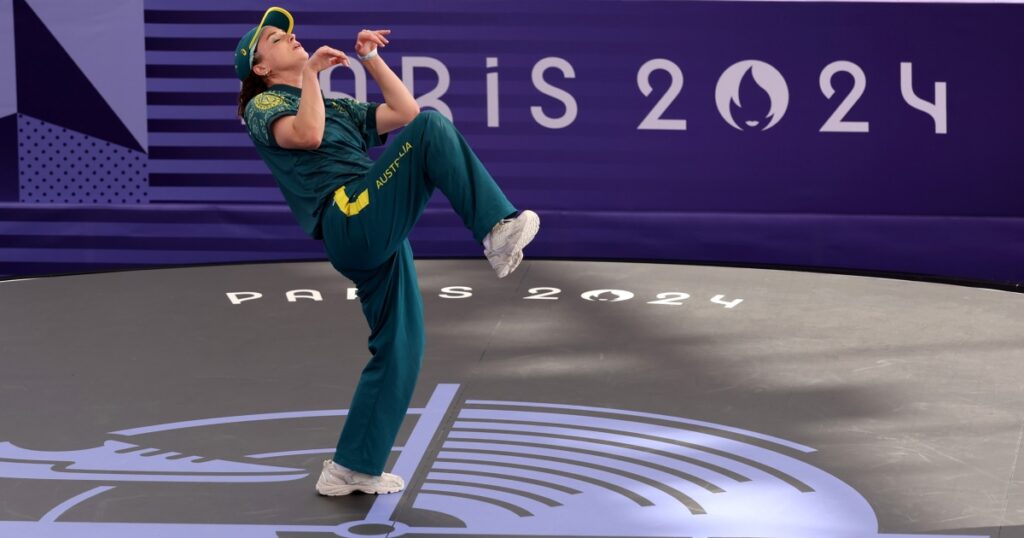Australian Olympic breakdancer Rachel Gunn says the hate she received following her performance at the Paris Games was “devastating”.
The 36-year-old B-girl, who goes by the name Raygun, responded to the intense and relentless online criticism in a short video message posted to Instagram on Thursday.
She began by thanking her supporters.
“I really appreciate all of the positivity and I’m happy I can bring joy into everyone’s lives,” she said. “That’s what I wanted.”
Gunn said he had no idea it would “open the door for so much hate. Frankly, it’s been pretty devastating.”
Social media memes and skits recreating her dance moves exploded on the internet after a video of her routine went viral, particularly the move in which Gunn leans back with her arms close to her body while kicking one leg up in the air, which quickly became known as “Kangaroo,” after her home country.
Gunn said in a post Thursday that she “enjoyed” her routine but took it very seriously.
“I’ve trained so hard for the Olympics and really gave it my all. I’m honoured to be part of the Australian Olympic team and to contribute to breaking’s Olympic debut,” she said.
Gunn did not specifically address the rumors surrounding her performance, but called on the Australian Olympic Committee (AOC) and others to issue statements defending her against critics who have questioned how she was selected for the national team. AOC chief executive Matt Carroll said in a statement early Thursday that Gunn was selected for the national team “through a transparent and independent qualification and nomination process.”
He also slammed a Change.org petition accusing Mr Gunn of “rigging the selection process in his favour”. The petition demands an apology from Mr Gunn and head of the Paris delegation, Anna Mears. The petition has garnered more than 56,000 signatures.
“It is shameful that falsehoods fabricated by anonymous individuals should be published in this way. It amounts to bullying, harassment and defamation. We demand that it be removed from the site immediately,” Carroll said, adding that the petition has no factual basis.
Rachel Gunn competes in the women’s B round robin at the Paris Olympics on August 9. Ezra Shaw/Getty Images
The Australian Breaking Association said in a statement on Tuesday that the qualifying round took place over two days and was conducted under World DanceSport Federation rules, which are in line with International Olympic Committee standards. Gunn and fellow Australian breaker Jeff Dunn came out on top, the association said.
“We condemn the worldwide online harassment and bullying against Raegan. The pressure to perform on the Olympic stage must be immense, especially when facing opponents from her own particular group. We stand in solidarity with Raegan,” the group said.
Olympic breaking referee Martin Gillian said Gunn “tried her best” but “her level may not have been as high as some of the other competitors.”
“It’s fantastic that she’s taking on the challenge and wearing a tracksuit to do it,” Prime Minister Anthony Albanese said in a recent radio interview. “It’s quintessentially Australian.”
The World DanceSport Federation, breaking’s international governing body, said it had offered Gunn mental health support.
Gunn also addressed social media posts mocking her for receiving a zero score from Olympic judges.
“Little fun fact: there are actually no points in breakdancing,” she said, urging people to check the Olympics website to see how the judges rated her compared to the other competitors.
But the Olympics website says that judges will score the one-on-one battles on creativity, musicality, individuality, technique, performance and variety. The judges will vote after each round, and the breaker with the most points will be declared the winner.
At the end of her post, Gunn asked that the privacy of her family and the Blake community be respected.
“Everyone has had a very hard time as a result of this,” she said, adding that she would answer questions once she returned from a “planned holiday” in Europe.



